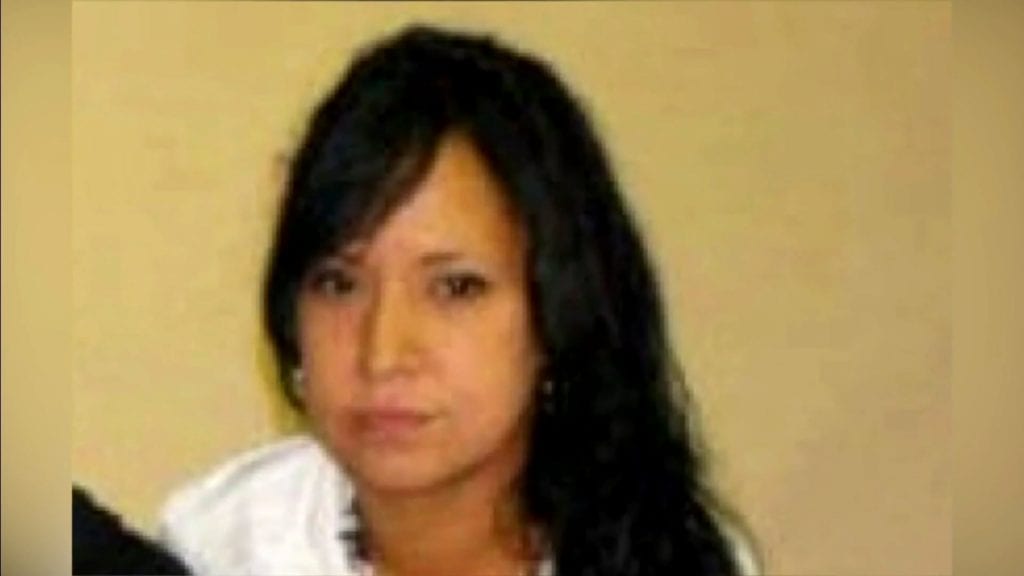
Cindy Gladue was a mother of three when she died in June 2011. Photo: APTN file
The family of Cindy Gladue says that Alberta Justice has lost her remains. A part of Gladue’s preserved remains were brought into the court room as an exhibit in the 2015 murder trial of Ontario trucker Bradley Barton
Gladue, 36, was found dead in a hotel room in Edmonton, Alta., in June 2011. Barton was eventually convicted for causing her death.
“They didn’t tell us until after the second trial when he was arrested for manslaughter,” said Marilyn Houle, Gladue’s younger sister. “We had a brief meeting at the University of Alberta… they told my mom and cousin Prairie that they misplaced her remains.
“Basically, they lost her private parts at the first trial.”
Neither the medical examiner nor the Crown prosecutor’s office has been in contact with the family since then, according to Houle.
“They never contacted me or my mother or anything.”
The spokesperson for the Alberta Ministry of Justice said that “[T]he matter of Cindy Gladue’s remains is under active investigation, and as a result, we are not able to comment.”
The family has said in the past that they were not aware that Gladue’s remains would be presented in the court room.
The road to justice has been long for Gladue’s family.
The accused was initially acquitted during his first trial in 2015 following a controversial prosecution.
Crown prosecutors decided to bring in the most intimate part of a woman’s body to be used as evidence in a jury trial.
A gynecologist and medical examiner told the court that Gladue had suffered an 11 centimeter tear to her vaginal wall.
It was the first time partial remains of a person had been removed, preserved and brought into the court room as evidence.
The exhibit was also projected on to a giant screen in the courtroom.
Jennifer Tomaszewski who teaches women, law and social change at the University of Alberta Law School told APTN News that she uses the Barton case to discuss Indigenous experiences with the legal system in court.
“We use this case as an example of the dehumanizing experience of Indigenous victims in the court,” said Tomaszewski.
“…it wasn’t just the defense, but also the Crown who continually referred to Cindy as both ‘native’ and ‘a prostitute’ thus potentially minimising the gravity of the harm done to her in the eyes of the jury.”
When the case went to the Supreme Court of Canada, the justices found that the trial judge had violated rape shield laws that are in place to protect the privacy rights of sexual assault victims.
Justice Michael Moldaver, who wrote the majority opinion and said that judges must do more to challenge stereotypes against Indigenous victims of violence.
“As an additional safeguard going forward, in sexual assault cases where the complainant is an Indigenous woman or girl, trial judges would be well advised to provide an express instruct aimed at countering prejudice against Indigenous women and girls,” he wrote.
Both lawyers have now been appointed to provincial court
Houle also told APTN she was “disappointed” to hear that two Crown prosecutors Carrie-Ann Downey and Carole Godfrey have now been appointed to Alberta Court of Justice.
Godfrey was appointed in 2020 and Downey will begin her appointment on April 17, 2023.
“It was terrible, the first trial. They called her a ‘hooker’ and a ‘prostitute,’” said Houle.
An Indigenous lawyer who spoke to APTN on condition of anonymity, also said they were disappointed.
“This just shows you what they reward in our system,” said the lawyer. “To be honest I am saddened that this colonial system, this criminal justice system fails Indigenous women specifically all the time.
“To dehumanize an Indigenous woman who has been killed in this way I think speaks volumes about the value of Indigenous lives in Canada.”
When asked about what the Alberta Court of Justice does to address the potential biases of those appointed to the bench, a spokesperson told APTN in an emailed statement that the court “does not comment on the appointments of any individual Justices made by the Minister.”
“The Court and its leadership recognize that Indigenous peoples – and in particular Indigenous women – have often been ill-served by the Justice system. We are committed to addressing this inequity and its legacy,” read the statement.
The statement further said the Court has an Indigenous justice strategy.
According to the statement, the strategy includes “providing educational opportunities for Justices so as to ensure broad-based understanding of the history, heritage, and laws of local communities as well as an understanding of and, where appropriate, the participation in cultural activities.”










